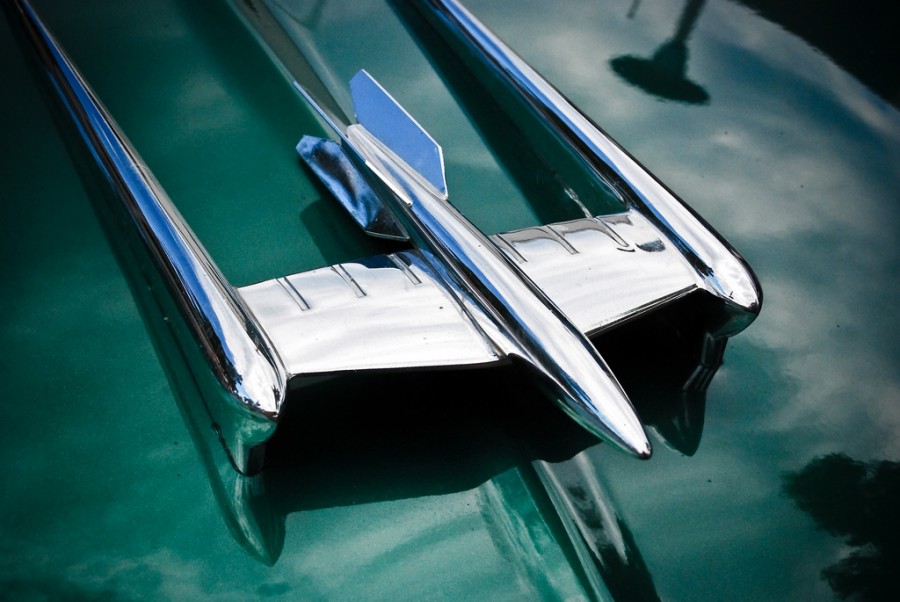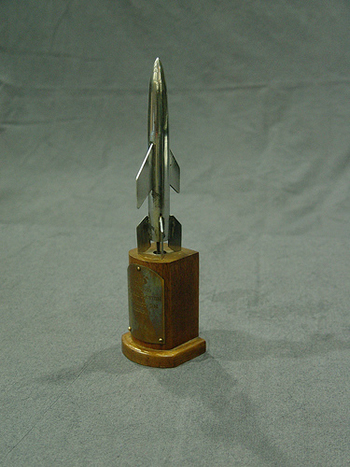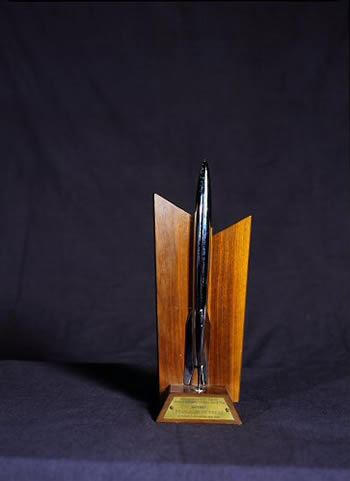
About those awards…
Let’s begin with another lesson in Hugo history. First stop, 1953. The first Hugo Awards were presented at the 11th worldcon, in Philadelphia. Robert Silverberg tells me that they were not even called “Hugos” back then, just “Science Fiction Achievement Awards.” Isaac Asimov was the Toastmaster. There were only seven categories that first year. Forry Ackerman was “# 1 Fan Personality,” Philip Jose Farmer was “Best New Author or Artist,” Willy Ley took one for “Excellence in Fact Articles,” Virgil Finlay was “Best Interior Illustrator,” Hannes Bok and Ed Emshwiller ‘tied’ for “Best Cover Artist,” ASTOUNDING and GALAXY ‘tied’ for “Best Professional Magazine,” and — drumroll, please — Alfred Bester won for Best Novel (the big one, then as now) with his soon-to-be-classic THE DEMOLISHED MAN.
Several things should be noted about the Philadelphia awards. First, they were widely regarded as a one-time thing; no one imagined at that time that they would become an annual event and the climax of worldcon. (And, indeed, no awards were given the following year, at the 1954 worldcon).
Also, there were no losers that year, only winners. No voting, no shortlist. These were all what we would call today ‘committee awards,’ the honorees chosen entirely by the members of the concom by some arcane process. The ‘ties’ did not result from an equal number of votes, therefore; it was just that the con runners felt both were worthy. Fannish legend tells us the first awards were made from Oldsmobile hood ornaments (but more on that later).
There has been much debate of late about the value of a Hugo. Whether or not it has actual monetary value, whether it can boost a writer’s career or lead to larger advances. Back in 1953, no one was thinking that way. Look at those first awards, and you can see what the rocket is all about. The Hugos are an “Attaboy! You did good.” They are SF thanking one of its own for enriching the genre, for giving them pleasure, for producing great work. Also, they come with a really cool trophy. Bottom line, that’s what matters.
After skipping 1954, the awards came back in 1955 at the Cleveland worldcon, and have been with us ever since. Clevention was well before my time, but my understanding is that this was the first time we had actual balloting for the winners. This may also been the first time the awards were called Hugos, though I have been unable to document that. The categories were slighly different from 1953, and have continued to evolve and change ever since.
Fast forward to 1976, and that first Hugo Loser Party in Kansas City. I have written, below, of how Gardner Dozois acted as a herald/ doorman at that bash, loudly announcing each guest who attempted to enter, and proclaiming them either a winner or a loser. Losers were cheered and welcomed, winners booed and pelted with peanuts, etc.
Which leads me to the moment when Alfred Bester himself appeared in the door. “ALFIE BESTER,” the great Gargoo roared at him. “You may not pass! You won the FIRST Hugo!!!” And the boos rose up like thunder. But Alfie was undeterred. “Yes,” he shouted back, “but it was an Oldsmobile hood ornament, and it’s all pitted and rusted and corroded now!” And the boos changed to cheers, and Alfie entered the party and proceeded to drink us all under the table, thereby establishing the principle that even legendary winners can become losers with sufficient time and corrosion.
Here’s a fiddling footnote, though. In the twenty-three years between the Philadelphia and KC worldcon, Alfie’s rocket almost certainly suffered pitting and rust. I have seen other Hugos from the 50s, and time has left its marks on all of them. But he was wrong as well; the ’53 rockets may have been inspired inspired by the Oldsmobile hood ornaments, but they were not actually made from same. Maryland fan Jack McKnight made those first awards himself in his machine shop, working all through the con and finishing just in time for the presentation. Which is not to say that the ‘hood ornament’ legend is entirely wrong. Just the date is off. It was the 1956 Hugos that are actually Oldsmobile hood ornaments. Dave Kyle made the awards that year. Kyle presumably lacked McKnight’s machine shop and metal-working skills, so he raided some junkyards for hood ornaments from the 1950 or 1951 Oldsmobile Rocket 88, and screwed them to an upright wooden stand. Take a look for yourself:

1950 Oldsmobile hood ornament
1953 Hugo
1956 Hugo
[[You can find all this history, and pictures of every Hugo since the beginnings of the award, at the official Hugo site at http://www.thehugoawards.org/ Go check it out, it’s cool]].
Fast forward again, this time to present.
This past year has been a tough one for all of fandom, and especially those of us who love SF, fantasy, worldcon, and the Hugos. Puppygate injected a note of discord and division and vitriol into the awards process unlike anything ever seen before in the long history of the awards. You all know the facts; I am not going to rehash them again here.
I have been a Hugo winner, and a Hugo loser, and a Hugo presenter, many times. I hated this year’s discord, and I could see how much damage it was doing. I felt I had to speak out about what was happening, and I did. I engaged in dialogue (relatively civil) with the Sad Puppy leaders Brad Torgersen and Larry Correia in hopes of somehow finding some common ground and effecting some sort of reconciliation; sadly, that effort failed. With the passage of months, things got worse instead of better.
In any Hugo season save the first, there are more losers than winners. Five nominees per category means one winner and four losers. Multiply that by the number of categories, and the losers way outnumber the winners. Always have, always will. And, yes, it IS an honor just to be nominated… but that does not soften the sting when the envelope is opened and someone else’s name is called out. I know, I’ve been there many times, and not just at the Hugo Awards (six time Emmy loser here, and I will be going for seven next month).
And this year, thanks to the slates, we had more losers than ever before. This year, indeed, we were all losers. Some lost the usual way, finishing behind an eventual winner. Others lost to No Award, an especially galling sort of defeat. (Which also created five losers in those five categories instead of four). Even the winners lost, since their victories will always bear as asterisk in the minds of some because they triumphed under such unusual circumstances, over a weakened field, or whatever. (I don’t necessarily endorse this viewpoint. I think some of this year’s winners deserve an exclamation point rather than an asterisk. But I have heard a fair amount of the asterisk talk even on Hugo night itself). The Hugos lost: five No Awards is an occasion for mourning, not cheers. The genre lost: I don’t buy that even bad press is good, and we sure got a lot of bad press this year. Fandom lost: division and discord poisoned our annual celebration of love for SF, and left wounds that will be a long time healing. The nominees who withdrew from the slates lost; they walked away from a Hugo nod, a painful thing to do, and were abused for that decision. The nominees who stayed on the ballot lost; they were abused for that decision too, and some, who were NOT Puppies and never asked to be slated, saw their Hugo chances destroyed by the Nuclear option. Some nominees managed to catch flak from both sides.
And there was another class of loser, less visible, but still very much a victim of the slates. Those writers who produced outstanding work in 2014, and who, in a normal year, would have almost certainly received Hugo nominations. Some might even have won rockets. But this was NOT a normal year, and the usual word-of-mouth buzz and fannish enthusiasm that generally carries a story to a place on the Hugo ballot could not and did not prevail against the slate-mongering of the Sad Puppies and the lockstep voting of the Rabids. These were the invisible losers of the 2015 Hugo season. Losing is a part of life, and certainly of the Hugos… but it is one thing to be beaten in a fair contest, and another to be shoved aside and denied the chance to compete.
It was for those ‘invisible losers’ that I decided to create the Alfies. If one accepts that the Hugo has value, these writers had suffered real harm thanks to the slates. There was no way I could hope to redress that… but I could make a gesture. In the door of my room in KC in 1976, Alfie Bester told us that winners can become losers. If so, losers can become winners too. I would give my own awards… and of course I’d name them after Alfie.
So that’s how the Alfies came about.
Next rock, I’ll tell you about their creation… and who won them.




